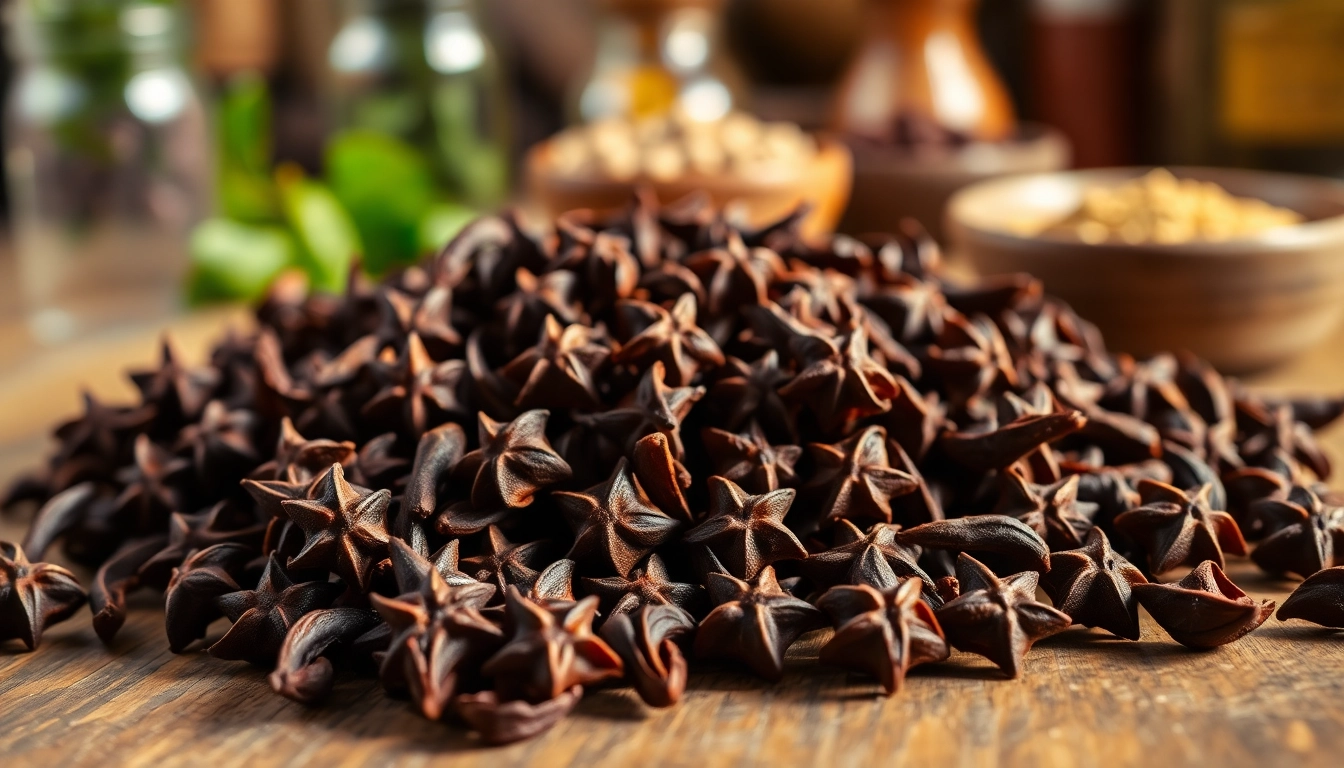What Are Cloves: Characteristics and Flavor Profile
The Botanical Overview of Cloves
Cloves are the aromatic flower buds of a tree in the family Myrtaceae, scientifically known as Syzygium aromaticum. Native to the Maluku Islands, also known as the Moluccas in Indonesia, cloves thrive in tropical climates. The buds are harvested when they are still immature, picked, and then dried to form the dark brown spice many recognize today. This culinary spice has been a staple in global cuisine and traditional medicine for centuries, with its unique properties and fragrance cherished around the world.
Aroma and Taste – What to Expect
The unmistakable aroma of cloves is warm, spicy, and sweet, contributing complexity to both savory and sweet dishes. This fragrance is primarily due to the compound eugenol, which represents approximately 70-90% of the oil extracted from cloves. The taste of cloves is intense; it has a slightly bitter and astringent quality, which may not be appealing in large quantities. However, when used judiciously, cloves can enhance flavors, making it a popular ingredient in spice blends, marinades, and even desserts. The ability of cloves to enhance the profile of dishes is something modern chefs and home cooks alike admire.
Understanding Varieties of Cloves
There are primarily two types of cloves available in the market: Maluku clove and Ceylon clove. The Maluku variety, often referred to as the Indonesian clove, is more potent and commonly used. Ceylon cloves, on the other hand, are considered to be milder and are often sought after for their delicate flavor and aroma. Understanding the differences between these varieties can greatly influence cooking decisions, as the intensity of flavor can drastically alter a dish.
Health Benefits of Cloves: Nature’s Gift to Wellness
Nutritional Content of Cloves
Rich in essential nutrients, cloves boast a high content of manganese, vitamins C and K, and fiber. A mere teaspoon of ground cloves provides various minerals that support bodily functions, including calcium, magnesium, iron, and potassium. The significant presence of antioxidants in cloves, thanks to compounds like eugenol, helps combat oxidative stress, making this spice a powerful addition to a balanced diet.
Top 5 Health Benefits You Should Know
- Rich in Antioxidants: Cloves are loaded with antioxidants, which help reduce inflammation and lower the risk of chronic diseases.
- Digestive Health: Cloves have traditionally been used to enhance digestion, reduce bloating, and treat gastrointestinal discomfort.
- Oral Health: Due to their antimicrobial properties, cloves can help fight oral infections and are often utilized in dental care products to relieve toothache.
- Anti-Inflammatory Properties: The eugenol in cloves has been shown to reduce inflammation and pain, making it beneficial for conditions like arthritis.
- Boosting Immune Function: Cloves may help boost immunity by promoting the production of white blood cells and aiding in the body’s defense against infections.
Potential Side Effects and Precautions
While cloves are generally safe for most individuals, excessive consumption can lead to digestive issues and potential allergic reactions. Pregnant women or individuals with bleeding disorders should exercise caution and consult a healthcare professional. Eugenol, while beneficial in moderation, may cause liver damage if ingested in high quantities. It’s always advisable to consult with a healthcare provider before starting any new dietary supplement or herbal regimen.
Cooking with Cloves: Tips and Techniques
Incorporating Cloves into Your Dishes
Cloves are incredibly versatile in cooking. They can be used whole or ground, depending on the recipe. When using whole cloves, they can impart a stronger flavor when left in a dish during cooking, while ground cloves blend seamlessly into batters and spice mixes. To maximize their flavor, consider toasting whole cloves briefly before use; this helps to release their essential oils and can enhance their aromatic profile in dishes.
Creative Recipes Featuring Cloves
Here are a few creative recipes using cloves:
- Spiced Apple Cider: Combine cider, whole cloves, cinnamon sticks, and orange slices in a pot and simmer for a warming fall drink.
- Clove-Infused Rice: Add a few whole cloves while cooking rice; the result is a subtly spiced side dish perfect for various cuisines.
- Clove Cookie Popularity: Incorporate ground cloves into gingerbread or spiced cookies for an aromatic treat during the holiday season.
Pairing Cloves with Other Ingredients
Cloves pair well with various ingredients, enhancing their flavors. Popular pairings include:
- Citrus Fruits: The brightness of citrus complements the warm flavors of cloves—try them together in marinades or desserts.
- Other Spices: Cloves blend well with nutmeg, cinnamon, and cardamom in baked goods and curries.
- Meats: In savory dishes, especially in marinades for meats such as pork or beef, cloves can add depth to flavors.
Cloves in Traditional Medicine: History and Uses
The Use of Cloves in Ayurvedic Practices
In Ayurvedic medicine, cloves have been revered for their warming properties and health benefits. They are often used to promote digestive health and are believed to help balance the doshas—vata, pitta, and kapha. Clove oil is also utilized for its antiseptic properties and is applied topically to relieve pain and improve circulation.
Historical Uses of Cloves in Cultures
Historically, cloves were so valuable they were used as currency and played a significant role in global trade during the spice trade era. Their importance in culinary practices across Middle Eastern and Asian cuisines is well-documented. In Chinese medicine, clove was used to treat digestive issues and respiratory problems. In many cultures, cloves signified wealth and were often included in rituals and traditional ceremonies.
Current Research on Cloves in Alternative Medicine
Recent studies have spotlighted the potential of cloves in contemporary alternative medicine, primarily focusing on their anti-inflammatory and antioxidant properties. Research highlights the efficacy of clove oil in dental care and its potential role as a natural remedy for conditions like diabetes and high cholesterol, although more comprehensive clinical trials are necessary to substantiate these findings.
Where to Buy Quality Cloves: A Consumer’s Guide
Choosing the Right Type of Cloves for Your Needs
When shopping for cloves, consider the form they come in—whole or ground. Whole cloves typically offer a fresher flavor and can be stored for longer periods without losing potency. If possible, opt for organic varieties to ensure they are grown without harmful pesticides. You can find high-quality cloves from reputable spice vendors both online and in-person.
Top Brands and Products to Consider
Some notable brands include:
- Simply Organic: Known for their commitment to organic products and ethical sourcing.
- Penzeys Spices: Renowned for offering a wide variety of spices, including high-quality whole cloves.
- McCormick: A well-known brand that provides consistent quality and availability of ground cloves.
Understanding Pricing and Quality Indicators
The price of cloves can vary based on their quality, origin, and the form in which they are sold. Generally, whole cloves are slightly more expensive due to their longer shelf life and flavor intensity. Look for cloves that are plump, have a deep brown color, and are fragrant when using them as a quality gauge. Brands that focus on ethical and sustainable practices tend to have a higher price point but often offer superior quality.
Conclusion
Cloves are more than just a spice; they are a powerhouse of health benefits and culinary potential that transcends global cuisines. Their rich history, unique flavor, and health-promoting properties make them a cherished ingredient in many traditions. Whether you are incorporating them into your cooking or exploring their medicinal uses, understanding cloves can significantly enhance your culinary experience and wellness journey.



